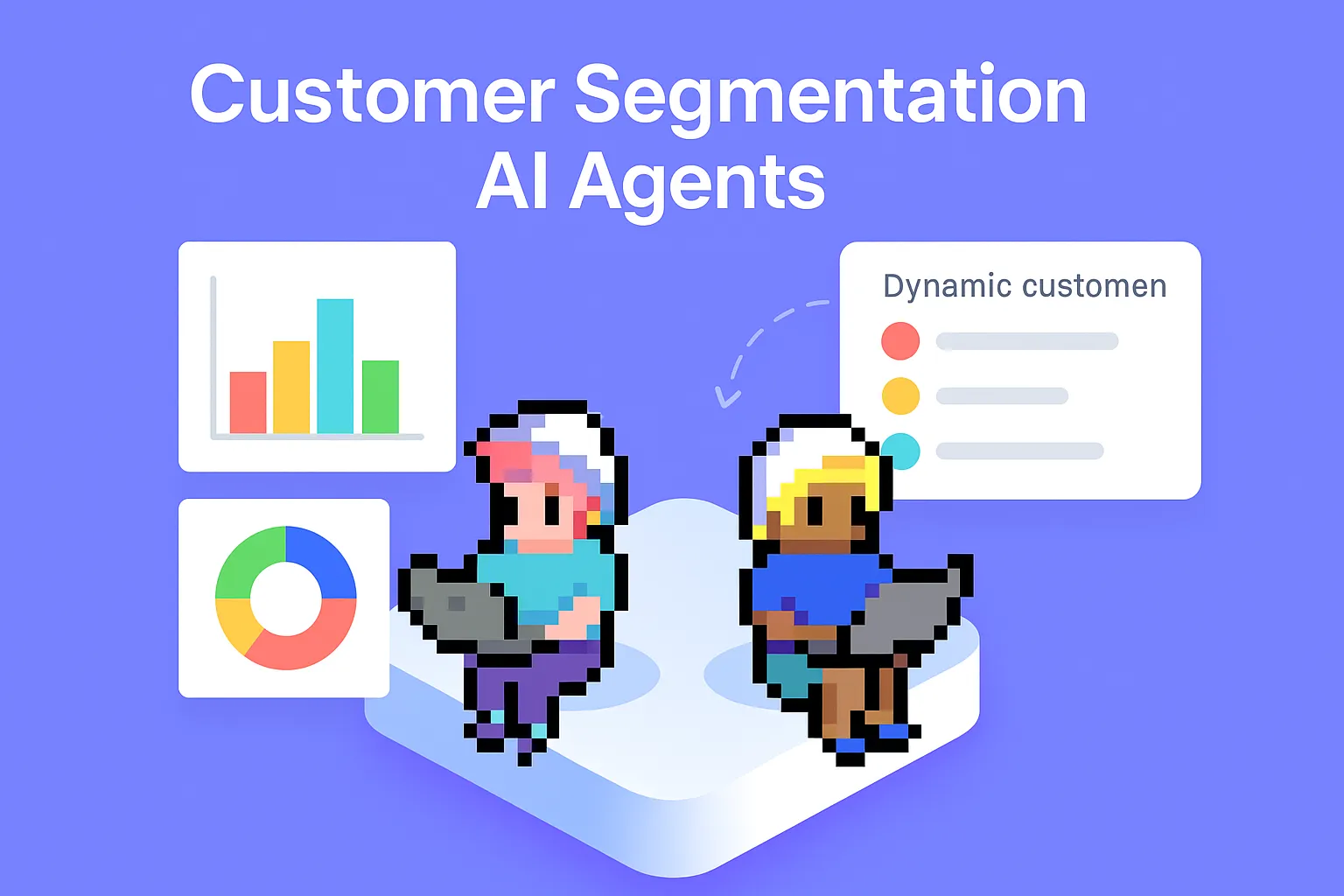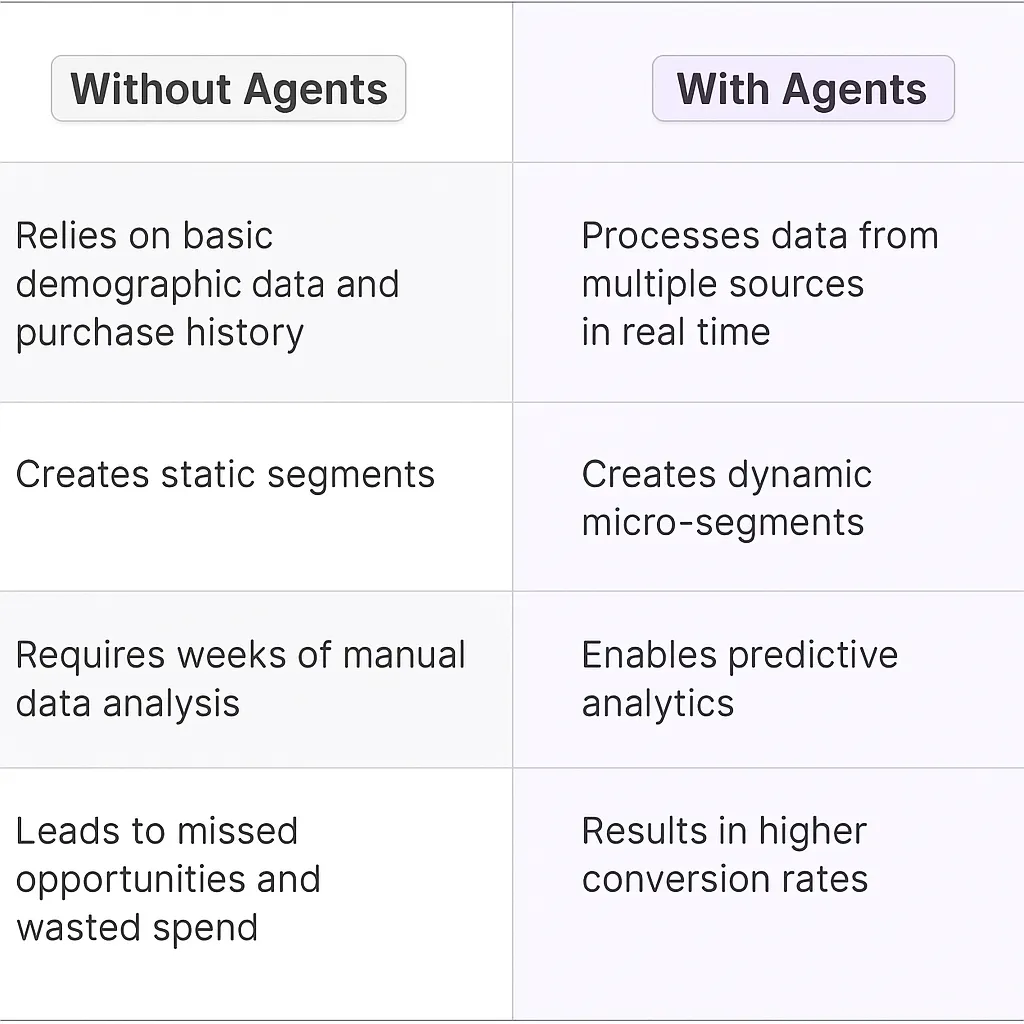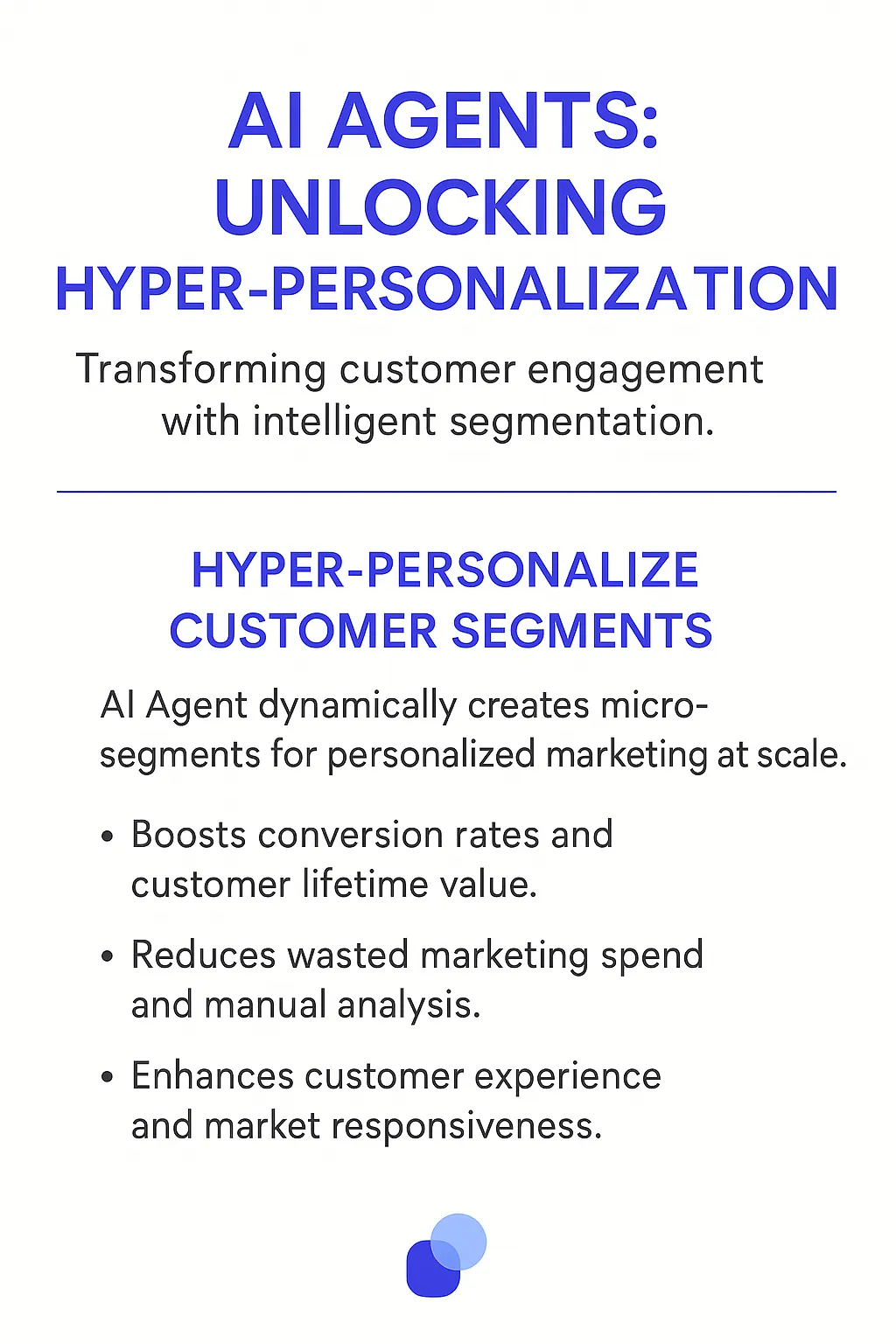Customer Segmentation AI Agents
The Evolution of Customer Segmentation with AI
Customer segmentation is the process of dividing a customer base into groups of individuals with similar characteristics. It's a fundamental marketing strategy that allows businesses to tailor their products, services, and communications to specific customer groups. Traditionally, this involved manual analysis of demographic data and purchase history. However, with the advent of AI agents, customer segmentation has evolved into a dynamic, real-time process that considers a much broader range of data points and behaviors.
AI-powered customer segmentation brings several game-changing features to the table:1. Real-time data processing: AI agents continuously analyze vast amounts of data from multiple sources, including social media, website behavior, and customer service interactions.2. Pattern recognition: These digital teammates identify complex correlations and patterns that human analysts might miss, leading to more nuanced segmentation.3. Predictive analytics: AI agents don't just categorize current customers; they forecast future behaviors, helping businesses stay ahead of trends.4. Dynamic segmentation: As customer behaviors change, AI adjusts segmentation in real-time, ensuring always-current insights.5. Micro-segmentation: AI enables the creation of highly specific customer groups based on subtle behavioral cues, allowing for personalized marketing at scale.These features collectively represent a quantum leap in how businesses understand and engage with their customers, opening up new possibilities for targeted marketing and product development.
The sophistication of modern AI agents means that data scientists can now uncover insights that were previously hidden in the complexity of customer data.

Benefits of AI Agents for Customer Segmentation
What would have been used before AI Agents?
Before AI agents entered the scene, customer segmentation was a labor-intensive process. Marketing teams relied on basic demographic data, purchase history, and maybe some rudimentary behavioral insights. They'd spend weeks crunching numbers in Excel, creating static segments that quickly became outdated. It was like trying to hit a moving target with a bow and arrow – possible, but not exactly efficient or precise.
Companies often resorted to broad, one-size-fits-all marketing approaches or, at best, a handful of generic customer personas. The result? Wasted ad spend, irrelevant messaging, and missed opportunities to connect with high-value customers. It was the marketing equivalent of throwing spaghetti at the wall and hoping something would stick.
What are the benefits of AI Agents?
Enter AI agents for customer segmentation, and suddenly we're playing a whole new ball game. These digital teammates are like having a team of data scientists, psychologists, and marketing gurus working 24/7 to understand your customers at a granular level.
First off, AI agents can process and analyze vast amounts of data in real-time. We're talking about combining traditional data points with social media activity, website behavior, customer service interactions, and even external factors like weather or local events. This level of analysis would take a human team months, if not years, to accomplish.
But it's not just about speed – it's about depth and accuracy. AI agents can identify patterns and correlations that human analysts might miss. They can create hyper-specific micro-segments based on subtle behavioral cues, allowing for truly personalized marketing at scale.
Moreover, these AI agents are constantly learning and adapting. As customer behaviors change (and let's face it, they change faster than ever in our digital world), the AI adjusts its segmentation in real-time. No more outdated personas or quarterly segmentation reviews – you're always working with the most current, relevant customer insights.
Perhaps most importantly, AI agents for customer segmentation enable predictive analytics. They don't just tell you who your customers are now; they can forecast future behaviors, helping you stay ahead of trends and customer needs. It's like having a crystal ball for your marketing strategy.
The end result? Higher conversion rates, improved customer retention, and more efficient allocation of marketing resources. It's not about replacing human creativity in marketing – it's about empowering marketers with unprecedented customer understanding, allowing them to craft messages and experiences that truly resonate.
In the world of customer segmentation, AI agents are the difference between using a magnifying glass and a high-powered electron microscope. They're not just an upgrade; they're a complete paradigm shift in how we understand and engage with our customers.

Potential Use Cases of AI Agents for Customer Segmentation
Processes
Customer segmentation is a critical process for businesses aiming to tailor their offerings and marketing strategies. AI agents can revolutionize this process, bringing a level of sophistication and efficiency that's hard to match with traditional methods. Let's dive into some key processes where these digital teammates shine:
- Data Collection and Integration: AI agents can seamlessly pull data from various sources - CRM systems, social media, purchase history, and even IoT devices. They're not just collecting data; they're creating a holistic view of each customer.
- Pattern Recognition: These agents excel at identifying complex patterns in customer behavior that might escape human analysts. They can spot correlations between seemingly unrelated factors, leading to more nuanced segmentation.
- Predictive Modeling: AI agents can forecast future customer behavior based on historical data and current trends. This allows businesses to segment customers not just on who they are now, but who they're likely to become.
- Real-time Segmentation Updates: As new data flows in, AI agents can continuously refine and update customer segments. This dynamic approach ensures that segmentation remains relevant in a fast-changing market.
- Cross-channel Analysis: These digital teammates can track and analyze customer interactions across multiple channels, creating a unified view of the customer journey and enabling more accurate segmentation.
Tasks
When it comes to specific tasks, AI agents for customer segmentation are true workhorses. They can handle a wide range of activities that traditionally required significant human effort:
- Demographic Analysis: AI agents can quickly categorize customers based on age, location, income, and other demographic factors, creating baseline segments for further analysis.
- Behavioral Segmentation: By analyzing purchase history, browsing patterns, and engagement metrics, these agents can group customers with similar behaviors.
- Psychographic Profiling: AI agents can infer customer values, interests, and lifestyles from various data points, enabling more personalized segmentation.
- Churn Risk Assessment: These digital teammates can identify customers at risk of churning based on engagement patterns and other indicators, allowing for proactive retention strategies.
- Lifetime Value Calculation: AI agents can predict the long-term value of different customer segments, helping businesses prioritize their marketing and retention efforts.
- Segment Overlap Analysis: These agents can identify where customer segments intersect, revealing opportunities for cross-selling or more nuanced targeting.
- Anomaly Detection: AI agents can spot customers who don't fit neatly into existing segments, potentially uncovering new market opportunities or refining segmentation criteria.
- Personalization Recommendations: Based on segmentation insights, these agents can suggest personalized content, offers, or products for each customer group.
By leveraging AI agents for these processes and tasks, businesses can achieve a level of customer understanding and targeting that was previously unattainable. This isn't just about efficiency; it's about unlocking new dimensions of customer insight that can drive real business growth.

Industry Use Cases: Customer Segmentation AI Agents
The power of AI agents in customer segmentation is reshaping how businesses understand and interact with their audience. These digital teammates are not just crunching numbers; they're uncovering hidden patterns and delivering actionable insights that can transform a company's approach to marketing and product development. Let's dive into some real-world applications that demonstrate how AI is elevating customer segmentation across different sectors.
From e-commerce giants fine-tuning their recommendation engines to fintech startups personalizing financial advice, AI agents are becoming indispensable allies in the quest for deeper customer understanding. They're not just tools; they're strategic partners that can parse through terabytes of data to identify micro-segments and predict consumer behavior with uncanny accuracy.
What's particularly exciting is how these AI agents are democratizing advanced customer segmentation techniques. Capabilities that were once the domain of tech behemoths with massive data science teams are now accessible to startups and mid-sized businesses. This leveling of the playing field is creating new opportunities for innovation and customer-centric growth strategies.
E-commerce: Precision Targeting with Customer Segmentation AI
The e-commerce landscape is a battlefield of conversion rates and customer lifetime value. Enter customer segmentation AI agents – the secret weapon that's giving savvy online retailers an edge.
Take Zara, the fast-fashion giant. They're not just selling clothes; they're selling personalized style experiences. Their AI agents dive deep into the data ocean, surfacing patterns invisible to the human eye. They're not just looking at basic demographics; they're analyzing purchase history, browsing behavior, social media interactions, and even local weather patterns.
The result? Micro-segments that are scarily accurate. You've got the "Trend-chasing Millennials in rainy Seattle" segment, or the "Office-to-happy-hour professionals in sunny Miami" group. Each of these segments gets its own tailored marketing strategy, product recommendations, and even personalized landing pages.
But here's where it gets really interesting. These AI agents aren't static. They're constantly learning and evolving. As customer behaviors shift (and in fast fashion, they shift fast), the AI adapts in real-time. It's like having a million marketers working 24/7, each one dedicated to understanding and serving a specific customer niche.
The impact? Zara's seeing higher conversion rates, increased average order values, and a bump in customer loyalty. They're not just selling more; they're building deeper, more meaningful relationships with their customers.
This isn't just a nice-to-have. In the cutthroat world of e-commerce, where a 1% improvement in conversion rate can mean millions in revenue, customer segmentation AI is becoming the difference between thriving and merely surviving.
The next frontier? These AI agents will start predicting fashion trends before they happen, allowing Zara to stay ahead of the curve in product development. It's not just about reacting to customer segments; it's about anticipating and shaping them.
Welcome to the future of e-commerce, where AI doesn't just understand customers – it understands them better than they understand themselves.
Financial Services: The AI-Driven Wealth Management Revolution
Let's talk about how customer segmentation AI is flipping the script in wealth management. This isn't your grandpa's financial advisor – we're talking about AI that's redefining what personalized financial services really mean.
Take Betterment, the robo-advisor that's been making waves. They're not just using AI to sort clients into broad buckets like "conservative" or "aggressive" investors. No, their AI agents are crafting hyper-personalized financial fingerprints for each user.
These digital teammates are crunching numbers on steroids. They're analyzing spending patterns, income fluctuations, life events, and even social media sentiment. The result? Micro-segments that are so precise, it's almost eerie.
You've got the "Tech startup founders with high risk tolerance but irregular cash flow" segment. Or the "Soon-to-retire teachers with a passion for sustainable investing" group. Each segment gets its own tailored investment strategy, personalized financial education content, and even customized UI/UX within the app.
But here's where it gets really juicy. These AI agents are predictive, not just reactive. They're spotting potential life changes before the user even realizes they're coming. Getting married soon? The AI noticed you've been browsing engagement rings online. It's already adjusting your financial data to account for potential wedding expenses.
The impact? Betterment's seeing higher user engagement, increased assets under management, and a serious boost in customer loyalty. They're not just managing money; they're becoming trusted life partners.
This isn't just a nice-to-have feature. In the ultra-competitive fintech world, where user acquisition costs are sky-high, this level of personalization is becoming the key differentiator. It's the difference between being a commodity service and being an indispensable part of your users' financial lives.
The next frontier? These AI agents will start cross-pollinating insights across different life domains. Your investment strategy won't just be based on your financial data, but on your health data, career trajectory, and even your dating life. It's not just about understanding your finances; it's about understanding you as a holistic individual.
We're entering an era where your wealth manager knows you better than you know yourself. And in the high-stakes world of personal finance, that knowledge is pure gold.
Considerations
Technical Challenges
Implementing a Customer Segmentation AI Agent isn't a walk in the park. It's more like trying to solve a Rubik's Cube blindfolded while riding a unicycle. The first hurdle? Data quality. Your AI is only as good as the data it feeds on, and most companies' data is about as organized as a teenager's bedroom.
Then there's the algorithm selection. It's not just about picking the fanciest machine learning model off the shelf. You need to consider interpretability, scalability, and how it handles the inevitable outliers in your customer data. It's like choosing between a Ferrari and a pickup truck - sure, the Ferrari looks cool, but can it handle the bumpy road of real-world data?
Integration with existing systems is another beast. Your shiny new AI needs to play nice with your CRM, marketing automation tools, and that ancient database Jerry from IT refuses to update. It's like trying to get your smart home devices to communicate with your grandma's rotary phone.
Operational Challenges
On the operational side, you're dealing with a whole different set of headaches. First up: the skills gap. Unless you're Google or Facebook, chances are your team isn't brimming with AI experts. You'll need to either upskill your existing team or bring in new talent. And let me tell you, finding good AI talent is about as easy as finding a unicorn that speaks Klingon.
Then there's the change management aspect. Introducing an AI-driven segmentation system is going to ruffle some feathers. Your marketing team, who've been segmenting customers based on their horoscopes and favorite ice cream flavors, might not be thrilled about a machine taking over. You'll need to manage expectations, provide training, and maybe invest in some tissues for the inevitable tears.
Privacy and ethical considerations are another minefield. Your AI might be great at predicting customer behavior, but if it's doing so by snooping on their private messages or making assumptions based on protected characteristics, you're in for a world of legal and PR pain. It's a delicate balance between being data-driven and being creepy.
Lastly, there's the ongoing maintenance and monitoring. An AI system isn't a set-it-and-forget-it solution. It needs constant feeding, tweaking, and babysitting. You'll need to set up processes for monitoring its performance, retraining it as customer behaviors change, and making sure it doesn't go rogue and start classifying all your customers as potential supervillains.
Implementing a Customer Segmentation AI Agent is a complex endeavor, but get it right, and you'll have a powerful tool that can transform your customer relationships. Just remember, like any powerful tool, it comes with its own set of challenges. Approach it with eyes wide open, a sense of humor, and maybe a stiff drink nearby.
The Future of Customer Engagement: AI-Driven Segmentation
Customer segmentation AI agents are not just a tool; they're a strategic asset that's reshaping how businesses connect with their audience. By processing vast amounts of data in real-time, identifying subtle patterns, and enabling predictive analytics, these digital teammates are unlocking unprecedented levels of customer understanding.The impact goes beyond just improved marketing efficiency. We're talking about a fundamental shift in how businesses perceive and interact with their customers. It's enabling a level of personalization and responsiveness that was previously unimaginable.However, implementing these AI agents comes with its own set of challenges. From data quality issues to the need for specialized talent, businesses need to approach this technology with eyes wide open. But for those who can navigate these hurdles, the rewards are substantial.As we look to the future, the potential of customer segmentation AI agents is only beginning to be tapped. We're moving towards a world where businesses don't just react to customer needs, but anticipate them. It's a brave new world of customer engagement, and AI is leading the charge.
The sophistication of these systems means that businesses can now leverage data-driven insights to create more meaningful connections with their audience than ever before.













